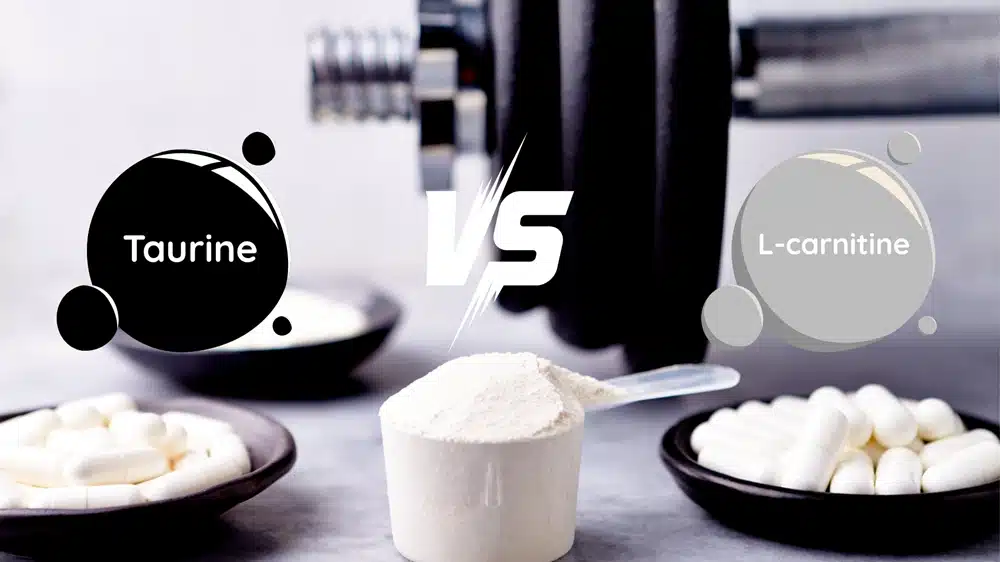
Looking to boost your workout and support overall health? Meet taurine and L-carnitine, a dynamic duo of amino acids that work synergistically in your body. While L-carnitine is famous for its role in transporting fatty acids into the mitochondria to be used for energy, taurine helps regulate fluid balance and muscle contractions, acting as a vital partner in maintaining cellular function during exercise. Together, they create a powerful combination that enhances athletic performance, aids in muscle recovery, and supports cardiovascular health, making them a top choice for anyone serious about optimizing their physical well-being.
what is Taurine?
Taurine is a naturally occurring amino acid that is found in various tissues and organs throughout the body, including the brain, heart, and muscles. While often mistakenly thought of as a stimulant, it is a “conditionally essential” amino acid, meaning that while the body can produce it, supplemental intake may be beneficial during times of stress, illness, or for individuals with dietary restrictions. It plays a key role in numerous physiological processes, such as regulating nerve function, maintaining proper hydration and electrolyte balance within cells, and supporting cardiovascular health.
The Proven Benefits of Taurine

Taurine is a fascinating amino acid that is not a building block for protein, but rather a “conditionally essential” molecule that plays a crucial role in maintaining cellular health. While the body can produce it, research suggests that supplementation may offer significant benefits, particularly in times of stress or for individuals with certain health conditions.
- Supports Cardiovascular Health: Taurine is highly concentrated in the heart and is known for its ability to regulate blood pressure and improve heart muscle function. It may help reduce the resistance of blood flow in blood vessel walls, leading to lower blood pressure. Studies have shown it can improve heart function in people with congestive heart failure.
- Enhances Exercise Performance: Taurine is a popular supplement among athletes due to its potential to improve athletic performance. Research indicates it may increase oxygen uptake, reduce muscle damage, and delay fatigue during intense workouts. This is thought to be a result of its role in regulating calcium levels within muscle cells and its antioxidant properties.
- Aids in Neurological Function: Taurine is abundant in the brain and is involved in numerous neurological processes. It is known to act as a neurotransmitter and has neuroprotective properties. Studies have explored its potential to protect against neurological disorders like Alzheimer’s and Parkinson’s disease, and its role in improving memory and brain function.
- May Aid in Diabetes Management: Some research suggests that taurine can enhance insulin sensitivity, which is a key factor in managing blood sugar levels. This can be beneficial for individuals with Type 2 diabetes or those at risk of developing the condition.
- Acts as a Powerful Antioxidant: Taurine has been shown to have strong antioxidant and anti-inflammatory properties, which help protect cells from oxidative stress and damage. This broad protective effect contributes to its potential benefits for various organs and systems, including the eyes and liver.
Real-World Cases and Studies
- Congestive Heart Failure: One of the most well-documented clinical uses of taurine is for heart failure. Studies have shown that supplementing with taurine can improve heart function, reduce symptoms, and increase the ability to exercise in people with congestive heart failure (WebMD). This is a strong indicator of its therapeutic potential.
- Athletic Performance: In a 2013 study, trained runners who took a taurine supplement before a 3km time trial saw a significant improvement in their performance compared to a placebo. While more research is needed to fully understand the mechanisms, this case provides a clear example of its ergogenic (performance-enhancing) effects in a real-world setting.
- Longevity and Healthy Aging (Animal Studies): A groundbreaking 2023 study published in the journal Science demonstrated that taurine supplementation extended the healthy lifespan of middle-aged mice by up to 12%. While this was an animal study and human trials are needed, the findings suggest that the decline of taurine with age could be a driver of the aging process, offering a promising avenue for future research and treatment. The study found that taurine improved health in almost every way, from bone mass to muscle strength and immune function.
what is L-Carnitine?
L-carnitine is a naturally occurring amino acid derivative that plays a crucial role in energy production within the body. Its primary function is to transport long-chain fatty acids into the mitochondria, which are the “engines” of our cells. Once inside the mitochondria, these fatty acids are burned for energy, a process that is especially important during exercise.
While the body can produce L-carnitine from the amino acids lysine and methionine, it’s also obtained from dietary sources, with the highest concentrations found in animal products like red meat, fish, and dairy. This makes it a popular supplement for vegans, vegetarians, and those looking to enhance their metabolism and athletic performance.
The Powerhouse Benefits of L-Carnitine

- Enhanced Exercise Performance and Recovery: By facilitating fat burning, L-carnitine can help improve endurance and delay the onset of fatigue. Research indicates it can reduce muscle soreness and damage after intense exercise. This makes it an ideal supplement for athletes looking to optimize their training and shorten their recovery time.
- Supports Heart Health: The heart relies heavily on fatty acids for fuel. L-carnitine helps ensure the heart has a steady supply of energy, and studies suggest it can improve heart function in people with certain heart conditions, such as those recovering from a heart attack.
- Aids in Fat Metabolism and Weight Management: Because it directly assists with the breakdown of fat for energy, L-carnitine is often used as a supplement for weight loss. While not a magic pill, it can be a valuable tool when combined with a balanced diet and regular exercise.
- Improves Cognitive Function: L-carnitine, particularly in its form Acetyl-L-Carnitine (ALCAR), can cross the blood-brain barrier. This makes it beneficial for supporting brain health and may offer neuroprotective benefits, potentially improving memory and cognitive function.
Real-World Cases & How to Take It
From competitive athletes to everyday fitness enthusiasts, L-carnitine is a staple in many supplement routines.
- Case 1: The Endurance Athlete: A long-distance runner struggling with fatigue in the final miles of a marathon may use an L-carnitine powder mixed into their pre-run shake. By enhancing their body’s ability to use fat for fuel, it helps spare muscle glycogen and provides sustained energy, allowing them to push through and finish strong.
- Case 2: The Weightlifter: A bodybuilder in a “cutting” phase, aiming to reduce body fat while preserving muscle, might take an L-carnitine capsule or softgel supplement daily. The convenient capsule form makes it easy to take with meals, helping to transport fat to be burned during their intense weight training sessions and cardio.
L-carnitine comes in various forms to suit different needs and preferences. You can find it as a simple powder that is easily mixed into beverages, a convenient capsule for on-the-go dosing, a solid tablet, or a liquid-filled softgel supplement. The choice of form often depends on personal preference for taste, absorption, and convenience.
Is it better to use Taurine and L-Carnitine together?
The short answer is: yes, it can be highly beneficial to use taurine and L-carnitine together, especially for athletic performance and metabolic health. While each compound offers powerful, distinct benefits on its own, they work in a complementary, synergistic way when combined. This means their combined effect is greater than the sum of their individual effects.
Why They Work Better Together
The synergy between these two compounds is based on their distinct yet complementary functions:
- Enhanced Energy Production and Fat Metabolism: L-carnitine excels at getting fat to the cellular “furnace” (the mitochondria). Taurine, by supporting overall cellular function and protecting the mitochondria from oxidative stress, ensures that this process can operate at peak efficiency. In simple terms, L-carnitine brings the fuel, and taurine makes sure the engine is running smoothly and protected from overheating.
- Optimized Athletic Performance: Combining them can lead to a dual benefit for athletes. L-carnitine improves the body’s ability to use fat as a fuel source, which can help spare glycogen stores and enhance endurance. At the same time, taurine’s ability to reduce muscle damage and promote recovery means you can train harder and bounce back faster.
- Cardiovascular Support: Both taurine and L-carnitine are highly concentrated in the heart and have independently demonstrated benefits for cardiovascular health. Together, they can offer a comprehensive approach to supporting heart function and blood vessel health.
Real-World Cases & Scientific Evidence
While many of the studies on taurine and L-carnitine are conducted individually, some research is beginning to explore their combined effects.
- Vascular Health: A key example of their synergy comes from a study published in the journal International Journal of Molecular Medicine. The research found that L-carnitine and taurine worked together to inhibit the proliferation of vascular smooth muscle cells, which is a process involved in conditions like atherosclerosis. The study concluded that L-carnitine actually stimulates the uptake of taurine by cells, making their combined action more effective than either supplement alone.
- Athletic Applications: While not a clinical trial, many pre-workout and performance softgel supplement and powder products already combine these two ingredients, recognizing their complementary effects. Athletes often report feeling a more sustained energy level and faster recovery when using a blend that contains both. The L-carnitine helps them tap into fat stores for fuel during long runs or intense circuits, while the taurine helps mitigate the inevitable muscle soreness and fatigue.
By including both a powder and capsule form in a product, manufacturers make it easy for consumers to benefit from this synergistic blend. Whether you prefer to mix a scoop of powder into a pre-workout drink or take a convenient tablet with your daily vitamins, the benefits of using these two compounds together are clear.
Taurine vs L-Carnitine: A Comparative Look
While both taurine and L-carnitine are popular amino acid-like compounds in the health and wellness world, particularly among athletes, they serve distinct and complementary roles in the body. This table provides a clear breakdown of their key differences and similarities.
| Feature | Taurine | L-Carnitine |
| Compound Type | Amino sulfonic acid (often referred to as an amino acid). | Amino acid derivative. |
| Primary Function | Regulates cell volume and hydration; acts as an antioxidant; supports neurological and heart function. | Transports fatty acids into mitochondria to be burned for energy. |
| Key Role in Metabolism | Maintains cellular stability and protects against stress, ensuring metabolic processes run smoothly. | Acts as a “shuttle” for fat metabolism, essential for converting fat into usable energy. |
| Main Dietary Sources | Abundant in animal-based foods like meat, fish, and dairy. | Primarily found in red meat. Also present in poultry, fish, and dairy. |
| Role in Exercise | Reduces muscle damage and soreness; delays fatigue; regulates calcium signaling for muscle contractions. | Enhances endurance by improving the body’s ability to use fat as a fuel source. |
| Primary Health Benefits | Supports heart health, vision, and brain function; acts as a powerful antioxidant. | Aids in fat metabolism, athletic performance, and cardiovascular health. |
| Formulations | Often sold as a standalone supplement in powder, capsule, or tablet form. | Available in various forms, including powder, capsule, tablet, and softgel supplement. |
conclusion
In the world of health and fitness, where countless supplements promise a silver bullet, the combination of taurine and L-carnitine stands out for its scientifically-backed synergy. Instead of choosing between fat metabolism and muscle protection, you get both in one powerful package. This dynamic duo provides a comprehensive approach to optimizing your body’s energy systems, enhancing performance, and accelerating recovery.
For consumers, finding a reputable brand is key. For businesses, the market for this potent combination is growing rapidly. If you are a brand looking to capitalize on this trend, partnering with a trusted dietary supplements OEM like Gensei can be the perfect solution. They have the expertise to formulate high-quality products that deliver on the promises of both taurine and L-carnitine, ensuring your customers get a product that is both effective and safe.
Ultimately, whether you’re an athlete pushing your limits or someone simply looking to improve their metabolic health, the evidence is clear: combining taurine and L-carnitine is a smart, strategic choice. It’s a blend that’s greater than the sum of its parts, offering a clear path to unlocking your full potential.
FAQs
What should not be taken with L-carnitine?
Avoid taking L-carnitine with acenocoumarol, warfarin (blood thinners), or thyroid hormones, as it may reduce their effectiveness or increase side effects.
What should you not mix with taurine?
Taurine may interact with antidepressants, anti-seizure drugs, statins, and blood thinners. Consult a doctor before combining.
Does L-carnitine reduce belly fat?
L-carnitine can aid in reducing belly fat by enhancing fat metabolism, especially when combined with exercise, but results vary and are not guaranteed.
Will taurine help with weight loss?
Taurine may support weight loss by inhibiting fat cell formation and improving metabolism, but it’s not a standalone solution and requires diet and exercise.
What are the side effects of L-carnitine?
High doses (around 3g/day) may cause nausea, vomiting, abdominal cramps, diarrhea, fishy body odor, muscle weakness (in uremia), or seizures (in seizure disorders).
Does L-taurine build muscle?
Taurine may increase muscle mass, strength, and power, reduce exercise-induced damage, and aid recovery, though mechanisms are not fully understood.
referenced 🔗
PubChem (a database of chemical molecules maintained by the National Center for Biotechnology Information): https://pubchem.ncbi.nlm.nih.gov/compound/Taurine
National Library of Medicine (a U.S. government agency): https://www.ncbi.nlm.nih.gov/pmc/articles/PMC3501277/
WebMD (a widely recognized health information website): https://www.webmd.com/vitamins/ai/ingredientmono-1024/taurine
Office of Dietary Supplements (ODS) – National Institutes of Health (NIH): https://ods.od.nih.gov/factsheets/Carnitine-HealthProfessional/
Linus Pauling Institute – Oregon State University:
https://lpi.oregonstate.edu/mic/dietary-factors/L-carnitine
PubChem – National Center for Biotechnology Information (NCBI): https://pubchem.ncbi.nlm.nih.gov/compound/L-carnitine
Taurine vs. L-Carnitine Overview – Speaking of Women’s Health: https://speakingofwomenshealth.com/column/benefits-of-l-carnitine-and-taurine
L-Carnitine and Taurine in Athletic Performance – NCBI: https://www.ncbi.nlm.nih.gov/pmc/articles/PMC8541253/
L-Carnitine Overview – Linus Pauling Institute: https://lpi.oregonstate.edu/mic/dietary-factors/L-carnitine
Taurine Overview – WebMD: https://www.webmd.com/vitamins/ai/ingredientmono-1024/taurine



